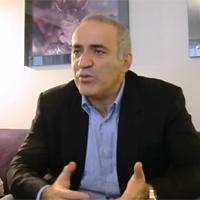
Garry Kasparov On The World Championship
[This is a letter sent to Chess.com from former World Champion GM Garry Kasparov. We are reprinting it here in its entirety.]
Carlsen-Anand II and the Psychology of the Rematch
By Garry Kasparov
Last year’s first world championship match between Magnus Carlsen and Vishy Anand was quite one-sided. After a predictably anxious start, Carlsen dominated to claim the crown in just ten games of the twelve scheduled, a 6.5-3.5 score without suffering a loss.
A year has gone by and Carlsen is already forced to defend his title. To the surprise of most, myself included, his challenger is Anand, who played his best chess in many years to win the Candidates tournament handily.

At first sight, this rematch looks like an unequal proposition. Both players are a year older, which can hardly be to the advantage of the 44-year-old Anand against his 23-year-old opponent. Over the past year Anand has been playing well and Carlsen playing less than his best, although tournament form has rarely been a useful indicator for world championship match success. Match play has many unique considerations and rematches have their own as well.

The quest to become world champion is a fire that burns hotter than any other. It is not possible to maintain the same level of a challenger’s relentless desire as champion. Anxiety and complacency are the natural enemies of the defending champion and they can be difficult to deal with, especially for the first time as Carlsen is doing in this match.

It has long been my belief that the anxiety of defending his reputation and his title, of facing even the tiniest possibility he might lose, is what drove Bobby Fischer away from the board for 20 years after he became champion. I stayed on top of the rating list for 20 years, even after losing my title to Kramnik in 2000, by always trying to find new challenges. I retired in 2005 when I felt I could no longer maintain my motivation in professional chess, without feeling like I was making a difference.

I played five world championship matches against Anatoly Karpov, though only the fourth, Seville 1987, was truly what I would consider a rematch in psychological terms. The first match was terminated, the second gave me the title, and the third was Karpov’s guaranteed rematch that really felt like an extension of the second.
When Seville began it was the chance to finally put the endless cycle of matches, and Karpov, behind me for a while and I felt a very different kind of pressure, which showed in my inconsistent play. Karpov, like any great sportsman, sensed his opponent’s anxiety and took strength from it.
When I won the final game to tie the match and retain my title the feeling of relief was indescribable. My victory cry to my team, “Three more years!” was the release of years of constant pressure.

Anand is playing in Sochi free of expectations or burdens. He has already held the highest title and will be remembered as a great champion. And he cannot do worse than the last match, after all! Carlsen is in the opposite position. With barely a year to enjoy his title, the goal of his short lifetime, he is now on the defensive with everything to lose and little to prove.

Of course, chess is not only about desire and psychology! Carlsen is stronger than Anand and should win the match – and I hope he does. Magnus is an active and ambitious young champion who will do many good things for the chess world I still care about deeply. It is only that it is a rematch that gives rise to any doubts at all.
The human mind is not a computer and our powers of calculation cannot be isolated from our emotions. That is why chess is a sport and not a science, and why I am excited to watch this rematch of generations.
Garry Kasparov
November 7, 2014
New York City


